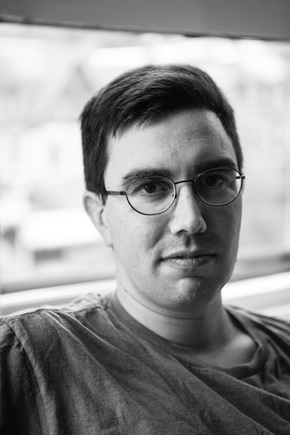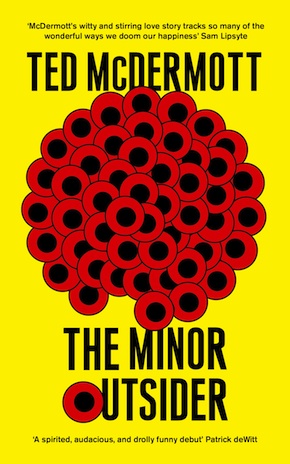Crushed
by Ted McDermottHow much was the thermometer worth? Five dollars? Ten? It wasn’t worth anything, but I reached into the industrial mixer to grab it, before the mixer, which I had just started, crushed the worthless thermometer.
When I reached in, the mixer grabbed me, held my hand, and crushed it. The mixer crushed my hand efficiently and slowly, while it also churned through the dough I’d been making, which wasn’t quite warm enough, according to the thermometer.
This was four years ago, sometime soon after dawn on a Sunday in February 2012, in a bakery in Missoula, Montana. I was twenty-nine years old. The machine crushed my hand like it was nothing, pressing it between metal and metal, beating the bone and muscle and whatever else was inside it.
When I finally removed my hand, it no longer looked like a hand. It was huge and blue and bloated and the fingers were all wrong. They weren’t in a row. The fingers were twisted and displaced, like those of an empty glove you just pulled out of your pocket, except not empty but pumped full to bursting. Full with the blue of blood gone bad.
The shock was such that I didn’t feel pain but I knew that I would, so I screamed a generic and half-hearted scream – “Ahhhh” – because it seemed like I should.
I went around the corner and held my pulped hand out to my two co-workers, who brought their hands to their mouths and said, “No,” but disagreement did nothing.
One of my co-workers, a recent mother, drove me to the emergency room, where they laid me on a table, put an IV in my arm, and pumped me full of Dilaudid, which felt cool inside my veins and my brain. The nurse told me not to look at my mangled hand. She looked like the kind of woman you wish were your mother: very clear skin, gold necklace with a simple pendant, hair pulled back by a wooden hair band. I knew I had done something wrong, and I wanted to apologize for it.
“I’m sorry. I’m sorry. I’m so fucking stupid.”
The nurse tried to reassure me. She put her delicate hand on my chest. She said, “Maybe the universe is trying to tell you something.”
Normally, her insight would’ve sounded obvious and cavalier, but I was lost in narcotics and pain and regret and her suggestion resonated. She was right, I felt, but how do you listen to something as inarticulate as the universe?
Until that moment, the possibility of listening wasn’t one I had considered, lost as I was in the relentless pursuit of being heard. I had spent my twenties devoted to writing. Writing false and clever fiction, motivated by the hope that I would be recognized as being brilliant for writing it.
The pain was so deep and powerful that it felt like a kind of fiery ache that burned through my entire body. I lived like that for days.”
I had spent three years writing a novel that took the form of a slideshow narrated by the narrator. It had a very long and indulgent title that I’m too embarrassed to even remember. It was set at a Mexican-themed roadside attraction on the North Carolina-South Carolina border. It was even more convoluted and pretentious than it sounds. Despite some efforts, I couldn’t convince anyone to read it, so I abandoned this first novel and started another.
This second novel was about a homeless balloon twister and a young father imprisoned for allegedly kidnapping his own daughter. It was written entirely in very long, sinuous sentences about things I know nothing about – namely, balloon twisting, prison and fatherhood. I went to a graduate creative writing program and made my classmates and teachers read it, critique it. I solicited their insight and used their advice to make what I believed were improvements. I rewrote the novel several times, from various points of view, in a range of styles, seeking a cosmetic solution to what were fundamental flaws.
After four years of diligent work, I came to this novel’s end and somehow convinced an agent to consider it. The agent, amazingly, said he was interested in taking it on. He scheduled an appointment to talk with me about it, over the phone. The appointment wasn’t for six weeks. I became overcome with optimism, with relief, with joy. I had long been obsessed with the desire to be validated for being good at writing, while also convinced this would never happen – but now it was happening. Or it would, anyway, in a matter of weeks.
I spent those six weeks imagining my conversation with this agent. I imagined his compliments. I imagined him telling me about how now he would sell my novel. I imagined my agent and my book and my validation. I called in sick to my job at the bakery on the day the agent was scheduled to call me, because what did my job matter now? Now I was going to be a writer, not a person who worked in a bakery while they tried to become a writer. I waited anxiously for my phone to ring.
In the meantime, I checked my email. I received an email from the agent’s assistant. The subject was “cancel call today”. The email itself was flippantly dismissive. The agent, the agent’s assistant wrote, wasn’t actually interested in my book and didn’t actually want to talk. No further explanation was offered. I was despondent: the hope of my desire being fulfilled had suddenly vanished. I was crushed, if you will. Two months later, I crushed my hand in an industrial mixer.
When they discharged me from the ER, my hand was unrepaired but wrapped in gauze and bandages. I was told to hold it above my heart, so the swelling would go down enough that they could do surgery and begin the process of rebuilding what was broken.
My co-worker drove me back to my apartment like that, with twelve broken bones in my right hand. The pain was so deep and powerful that it felt like a kind of fiery ache that burned through my entire body. I lived like that for days, lost in pain and painkillers, until a new nurse gave me a paper gown, an anesthesiologist erased reality, and a surgeon reconstructed my hand with pins and wires.
Over the next year or so, I collected workers’ compensation, took lots of painkillers, and rarely slept. And nearly every weekday I went to physical therapy, where a strong woman tried to make my fingers bend again, a knuckle at a time, a millimetre at a time, holding my fingers in once simple but now impossible positions, trying to force it do what it used to do. The therapist lent me a little machine connected to a pair of electrodes, which I stuck to either end of my forearm and which shocked me at prescribed intervals, at certain strengths. My brother came to visit and my girlfriend drove us northwest toward the Idaho panhandle and the machine sat on my lap, shocking my arm, while I tried to make a fist, while we passed through rain and mountains and sweeping valleys of fog.
One day, I was out at the physical therapist’s office, having my hand contorted, when someone I knew came in. A woman I knew tangentially, through a mutual friend. All I knew about her was that she’d nearly been killed in a car accident with a drunk driver. She looked excited and surprised to see me. She said, “I’m here with someone.” Behind her, there was a young man, smiling. The woman explained who he was.
What happened to my hand, I saw, was just one incident in a life full of good fortune and privilege. It was decisive but not a disaster.”
He was her boyfriend, she said. He worked in a meat-processing factory in town, and he accidentally stuck his hand in a meat grinder. His hand was so deep in the machine that they had to bring the meat grinder in with him – with his hand still inside it – when the ambulance took him from the factory to the hospital. They had to remove the machine during surgery.
The boyfriend sat down at another table in the room and the physical therapist went to him and unwrapped the bandage that covered his injured hand. When the bandage was off, I saw that he was missing half of his hand. With his other hand, his whole hand, he signed in sign language something to the woman I barely knew. The man missing half his hand was deaf.
What happened to my hand, I saw, was just one incident in a life full of good fortune and privilege. It was decisive but not a disaster. What it did was make me see that I had been living in a kind of panic and that I should stop. My panic had to do with seeking validation, which had to do with writing, so I decided to stop writing. What did I have to say? Who would ever listen? And why would they?
When I decided to stop, I tried to hear instead of trying to be heard. When I heard, I tried to try writing again, in a way: by recording the world as I saw it instead of inventing a new one that no one needed. The only way to listen to something as inarticulate as the universe, I found, was to slow down and pay closer attention to my experience in the universe. I started to write (one-handed) in third-person about my life, because if my life were my subject, I would have to try to notice it.
 Ted McDermott was born in 1982 and grew up in Columbia, South Carolina. His fiction and non-fiction have appeared in VICE, The Believer, The Portland Review, The Minus Times and elsewhere. He has been a baker, a mover, a cook, a college instructor, an encyclopaedist and a reporter. He lives in Missoula, Montana with his wife. The Minor Outsider, his first published novel, is out now from ONE. Read more.
Ted McDermott was born in 1982 and grew up in Columbia, South Carolina. His fiction and non-fiction have appeared in VICE, The Believer, The Portland Review, The Minus Times and elsewhere. He has been a baker, a mover, a cook, a college instructor, an encyclopaedist and a reporter. He lives in Missoula, Montana with his wife. The Minor Outsider, his first published novel, is out now from ONE. Read more.
tedmcdermott.com
Author portrait © Michelle Gustafson


